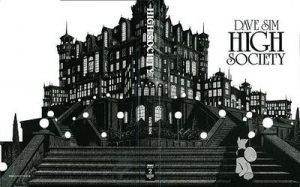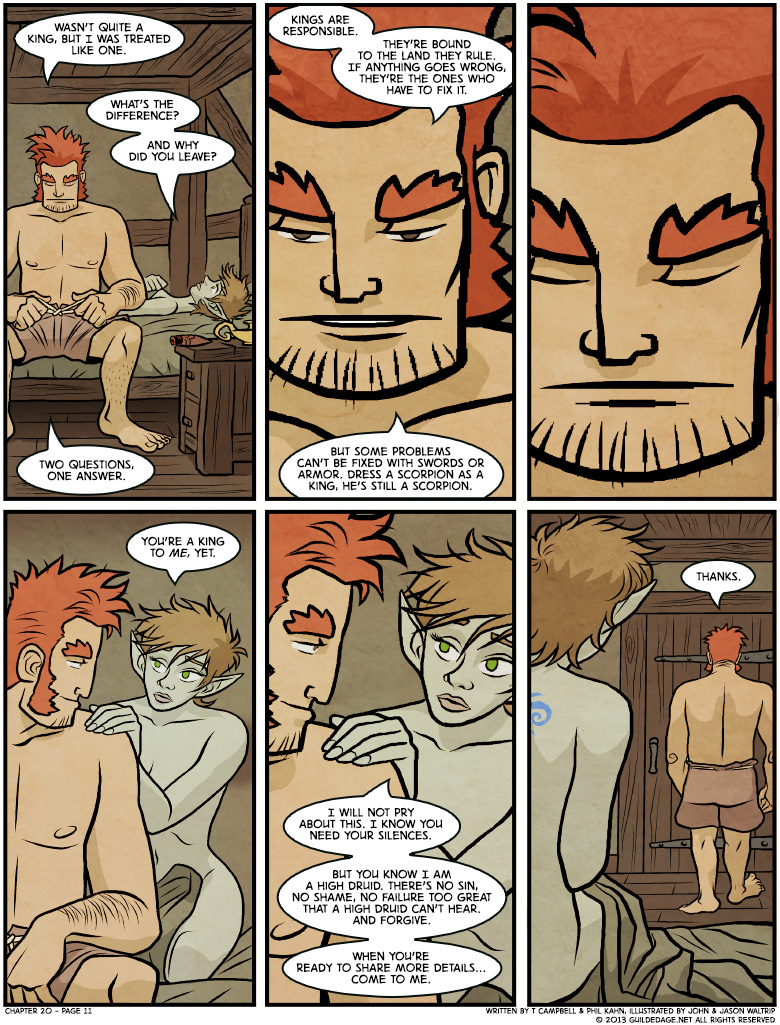Annotated 20-12
 I thought Scipio’s fear of taking on too much authority would be a plot point, and it never quite materialized as one. I expect he did eventually take Fr’Nj up on her offer, but she’s correct in panel 5: that’s as much sharing as he’s capable of in one sitting.
I thought Scipio’s fear of taking on too much authority would be a plot point, and it never quite materialized as one. I expect he did eventually take Fr’Nj up on her offer, but she’s correct in panel 5: that’s as much sharing as he’s capable of in one sitting.
One of my more embarrassing influences is Dave Sim’s Cerebus, an epic tale of a Conan-like warrior aardvark who goes from rags to riches to rags, several times. It was also an indie comic that transcended the late-twentieth-century marketplace to put out 300 monthly issues; therefore, it was instructive to my own efforts at lengthy comics series. But Cerebus has nevertheless had its achievements eclipsed by Sim’s descent into first misogyny and then just all-around crackpottery. (Every once in a while Sim trots out something new for his remaining faithful.)
The ways it went wrong probably outweigh the things it did right, though I could go on for a while about both. But here’s a pair of observations it got very right: getting power and keeping power are two different things, and you’ll never manage to keep power if you don’t change some as a person from who you were when living hand-to-mouth. Same way a lot of lotto winners end up right back where they were, financially speaking, a few years after taking the lump sum. Cerebus’ ascent from barbarian warrior to president and then to pope can’t help but end badly as a result. Scipio’s a lot nicer than Cerebus, but you can see the same lesson in his brief account of himself here.
(Other images I considered using here: “Scorpion King,” “With great power must come… great responsibility.”)











I read the whole 300 issues of Cerebus; the last 200 (it seems) were pastiches of a couple of his favorite authors – especially F. Scott Fitzgerald and Ernest Hemingway – and pretty much a labor to get through. When it was done, I was done with him. I think I looked at the first issue of his next project, but the misogyny that was running rampant through him pushed me away. “High Society”, though – that was aces.
That was my experience with him and the book. I started late, somewhere in the middle of “Mothers and Daughters”, but I loved most of the first half. I remember making a promise to myself that I’d reread it all once it reached the end… but the latter half forced me to change my mind.
Some creators who became problematic or were revealed as such all along, I can still enjoy their work… Cerebus is an example of a work which itself became poisoned, and I doubt I’ll ever be able to read it again.
The misogyny on display didn’t surprise; I paged thru an issue of “Following Cerebus” and Sim was attacking Buffy Summers because she was wearing makeup to bed. You know, because Hollywood and TV are perfect representations of Real Life. Geh. My fascination with train wrecks has me wanting to look at that Silver Surfer parody, but I like the character too much, it’d probably just get me mad.
So Scipio is like Westeros’ King Robert only with the wherewithal to know he’s a terrible king.
For all we know, he only realized when a mob told him and he had to flee for his life.
Some may argue that, by being fully aware of and fearing the responsibilities coming with kingship, Scipio may actually become a tolerably good king.
As I read it, he is stating that he was not put in the actual position of a king, but was just a glorified thug.
Whether or not he may have the skills for country leadership (and indeed, he was not trained for that), his position was not one where these skills could be put forward anyway.
It’s often said that one of the major qualifications for being a good king is to not want the job. Scipio, I think, worries too much that as king he’d have to come up to all the solutions to the problems by himself. But really, half the job of leadership is just knowing who to ask what questions.
Man, back before Dave Sim lost his mind, Cerebus was the best. Such a shame.
Once Dave’s dead, I predict someone will take sadistic pleasure in re-booting the entire thing into something Dave would have absolutely hated.
Fair’s fair.
“I know you need your silences” is a great line, and something I wish more people understood.
Indeed. Sometimes a great deal of work is being done in those quiet spaces between communicating with others.
I don’t think there’s any reason to be embarrassed by your influences, even if they’ve ended up becoming less than noble, so long as you have an accurate understanding of them, and don’t fall prey to hero worship. I mean, if we only learned from the noble, eventually we would fail to see the villains coming. We can do well to learn from flawed men, if only to try to see their flaws in ourselves and use them as an example of how we could go wrong.
It’s also important to remember that we’re all flawed people. Great works shouldn’t be ignored just because their creators were flawed. If that was the rule, we wouldn’t have any art or culture at all. Every one of us is offensive to someone else in some way. Yes, even you.
I’ve never read Cerebus, but it’s sad how many people turn out to be Milkshake Ducks. Although as long as a creator’s shittyness doesn’t carry over into their work, I don’t fault anyone for still being able to enjoy it.
That’s one advantage of long dead creators; H.P. Lovecraft’s shittyness was known long before I was even born, so it’s not like my childhood was tainted (I didn’t even discover him until well into adulthood), and he can’t benefit from me reading his stories (I think they’re even in the public domain by now).
Yeah, and there’s a definite difference between authors being problematic outside the work and authors interrupting their own work to announce their unsavoriest opinions; Sim unquestionably did the latter in “Reads.”
It’s an interesting phenomenon. Quite often an author does something distasteful in their work and a bunch of people quit reading, but then the only ones left to give feedback are the ones who still enjoy it, and the cycle can easily steer the author’s work off the rails and into some zany territory where he’ll find a small but fiercely loyal cadre of the insane to buy his books.
So, I guess the moral is, “Don’t pay too much attention to just your immediate audience.”